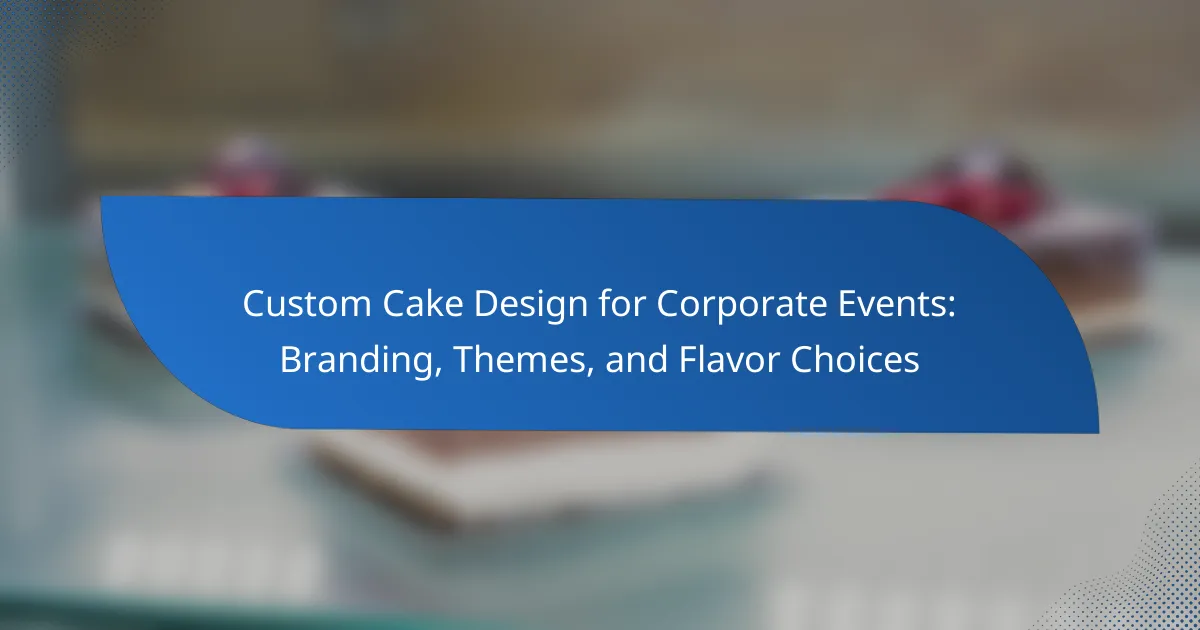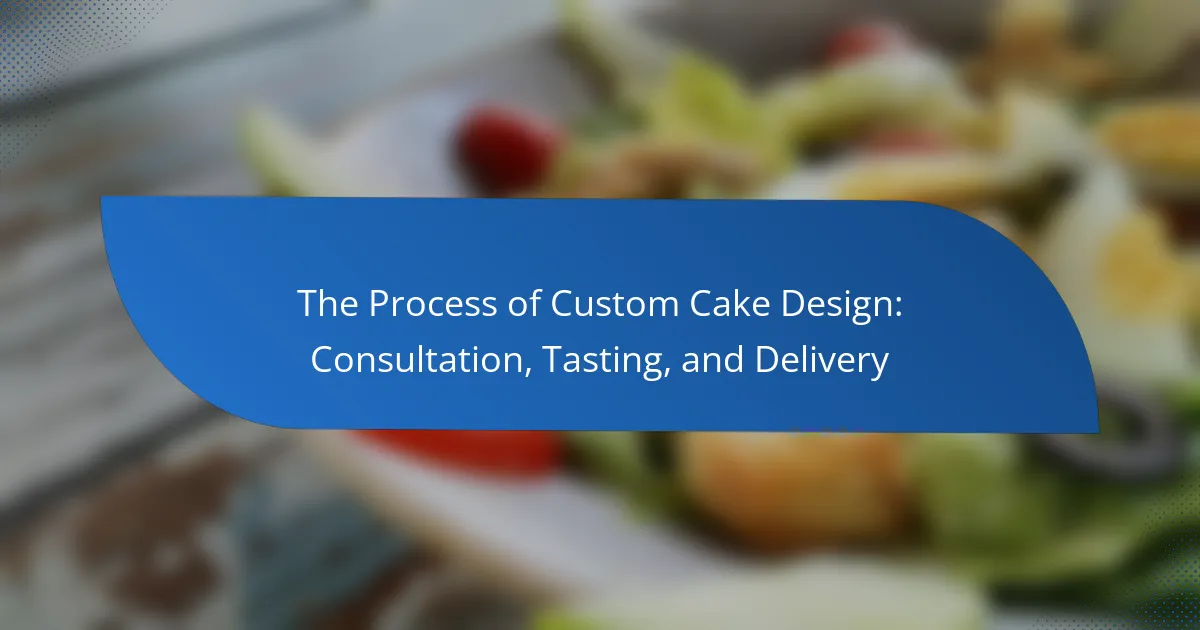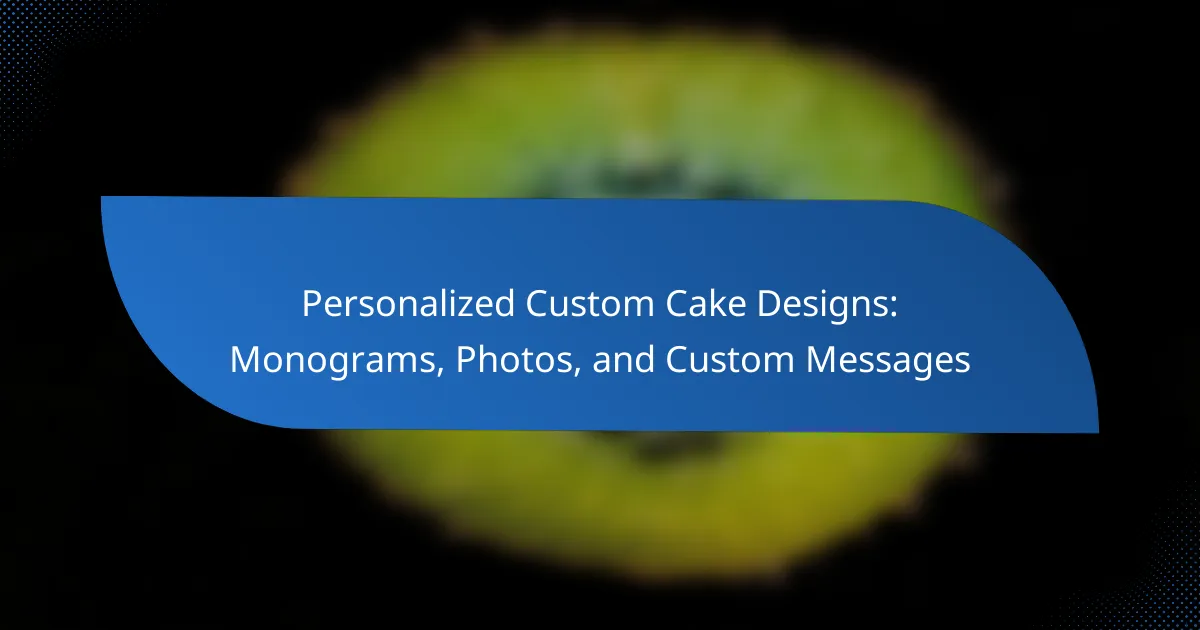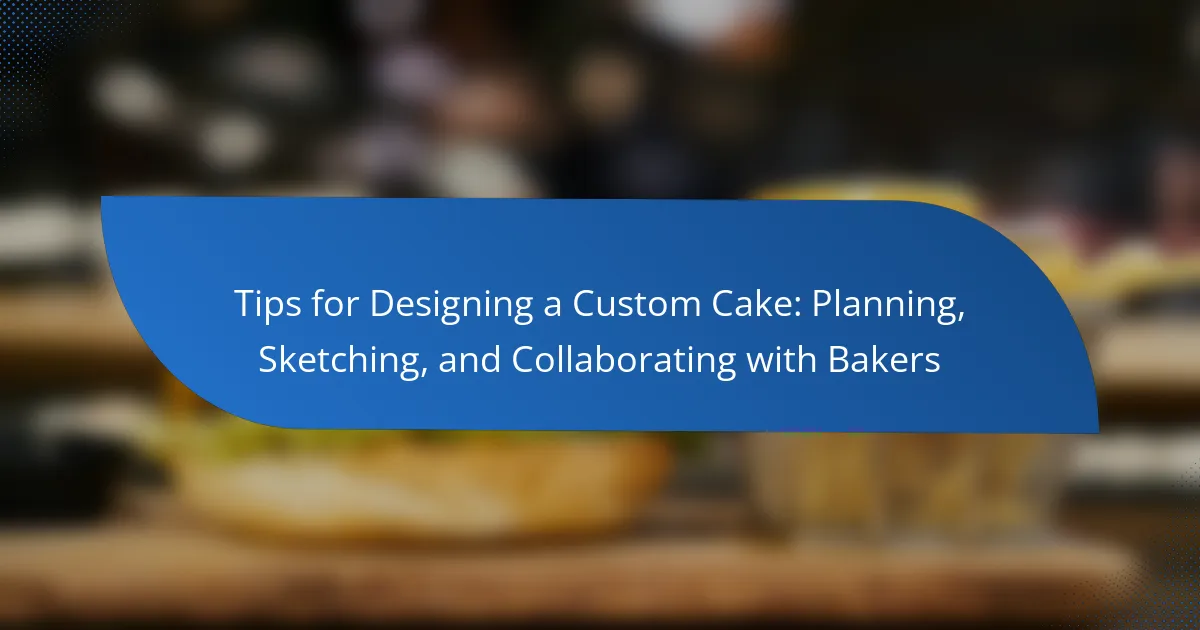Custom wedding cakes are specially designed cakes tailored to the preferences of couples for their weddings, encompassing unique styles, flavors, and decorations. These cakes reflect the couple’s personality and wedding theme, featuring intricate designs and personalized elements. Couples often have consultations with bakers to select flavors and design details, ensuring their cake meets their vision. Key considerations when ordering include flavor options, design alignment with the wedding theme, size based on guest count, budget, and dietary restrictions. Additionally, decorating techniques and food-safe materials are essential for enhancing the cake’s visual appeal while maintaining safety for consumption.
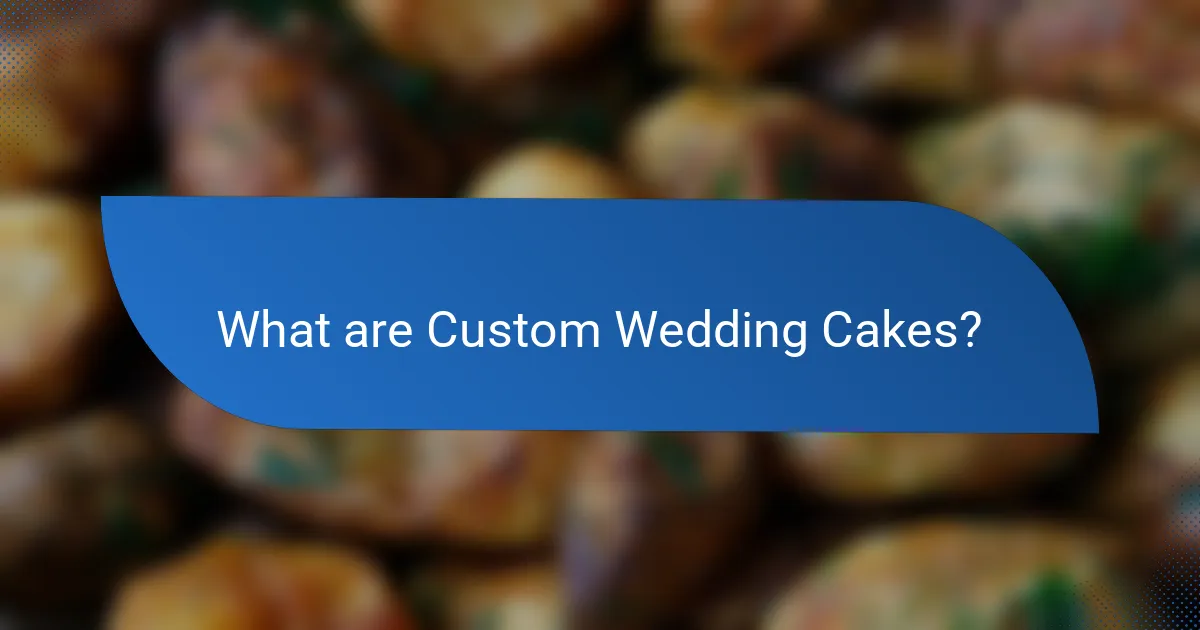
What are Custom Wedding Cakes?
Custom wedding cakes are uniquely designed cakes created specifically for weddings. They cater to the couple’s preferences in style, flavor, and decoration. Each cake can reflect the couple’s personality and wedding theme. Custom wedding cakes often feature intricate designs and personalized elements. Many bakers offer consultations to discuss ideas and tastes. This allows couples to select flavors that suit their preferences. Statistics show that 90% of couples choose custom cakes for their uniqueness. Custom cakes can range from simple to elaborate, depending on the couple’s vision.
How do Custom Wedding Cakes differ from traditional cakes?
Custom wedding cakes differ from traditional cakes in design, flavor, and personalization. Custom wedding cakes are tailored to the couple’s preferences, reflecting their unique style and theme. They often feature intricate designs, fondant decorations, and specific color schemes. In contrast, traditional cakes typically follow standard designs and flavors. Custom cakes can incorporate unique flavors like lavender or chocolate raspberry, while traditional cakes often stick to vanilla or chocolate. Additionally, custom cakes can include personalized elements such as monograms or themed decorations. This level of customization creates a memorable centerpiece for the wedding.
What are the key characteristics of Custom Wedding Cakes?
Custom wedding cakes are uniquely designed cakes tailored to individual preferences. They often feature personalized themes that reflect the couple’s style. Custom cakes can vary significantly in flavor, including options like vanilla, chocolate, and red velvet. They typically incorporate intricate decorations, such as fondant, buttercream, and edible flowers. Many custom wedding cakes are multi-tiered, adding height and visual appeal. They can also include specific dietary accommodations, such as gluten-free or vegan options. Each cake is made to order, ensuring freshness and quality. Custom wedding cakes are often a centerpiece at the wedding reception, symbolizing the couple’s union.
Why are Custom Wedding Cakes popular for weddings?
Custom wedding cakes are popular for weddings because they offer personalization and uniqueness. Couples can design cakes that reflect their personalities and wedding themes. This customization includes flavors, colors, and decorations. According to a survey by The Knot, 83% of couples opt for personalized cakes. These cakes enhance the overall aesthetic of the wedding. They serve as a centerpiece during the reception. Additionally, custom cakes can cater to dietary preferences and restrictions. This versatility makes them appealing to a wider audience.
What styles of Custom Wedding Cakes are available?
Custom wedding cakes are available in various styles. Popular styles include classic tiered cakes, rustic [censured] cakes, and modern geometric designs. Each style caters to different themes and preferences. Classic tiered cakes often feature intricate decorations and multiple layers. Rustic [censured] cakes have minimal frosting and showcase natural ingredients. Modern geometric designs utilize sharp lines and bold colors. Other styles include vintage lace cakes and whimsical themed cakes. These options allow couples to personalize their wedding celebration.
How can I choose a style that fits my wedding theme?
To choose a style that fits your wedding theme, identify the overall theme first. Consider elements like color schemes, venue decor, and personal preferences. Research cake styles that align with your theme, such as rustic, elegant, or modern designs. Consult with a cake designer to explore options that complement your theme. They can suggest specific flavors and decorations that enhance the overall aesthetic. Ensure the cake’s design integrates seamlessly with other wedding elements, like flowers and table settings. This cohesive approach creates a harmonious visual experience for guests.
What are some trending styles for Custom Wedding Cakes?
Trending styles for custom wedding cakes include minimalist designs, bold colors, and floral accents. Minimalist cakes focus on simplicity with clean lines and understated elegance. Bold colors are gaining popularity, moving away from traditional white to vibrant hues. Floral accents, whether real or sugar-crafted, add a touch of romance and personalization. Geode cakes feature edible crystals for a unique, eye-catching look. Textured surfaces, such as ruffles or brush strokes, create visual interest. Additionally, [censured] cakes, which showcase layers without full frosting, continue to be a favored choice. These trends reflect a desire for personalization and creativity in wedding celebrations.
What flavors can I choose for my Custom Wedding Cake?
You can choose a variety of flavors for your custom wedding cake. Common options include vanilla, chocolate, and red velvet. Other popular flavors are lemon, almond, and carrot. Specialty flavors like raspberry, coconut, and hazelnut are also available. Many bakeries offer unique combinations, such as chocolate mint or lemon blueberry. The choice often depends on personal preference and seasonal ingredients. Custom flavors can be created to suit individual tastes. Ultimately, the flavor selection can enhance the overall wedding experience.
How do I select flavors that appeal to my guests?
To select flavors that appeal to your guests, consider their preferences and dietary restrictions. Conduct a survey or ask for feedback from a diverse group. Popular flavors include vanilla, chocolate, and red velvet, which are widely appreciated. Incorporate seasonal ingredients for freshness and variety. For example, fruit flavors like lemon or strawberry can enhance taste. Additionally, consider pairing flavors with complementary fillings or frostings. Research shows that 75% of guests prefer familiar flavors over experimental ones. This data supports the idea of sticking to classic options while offering a few unique choices.
What are some unique flavor combinations for Custom Wedding Cakes?
Unique flavor combinations for custom wedding cakes include lavender and honey, which offers a floral sweetness. Another option is lemon and rosemary, providing a fresh and aromatic taste. Chocolate and chili create a rich and spicy experience. Red velvet paired with cream cheese and raspberry adds a tangy twist. Coconut and lime deliver a tropical flavor profile. Additionally, almond and orange blossom offer a fragrant and nutty combination. Each of these combinations brings a distinctive taste that can enhance the wedding cake experience.
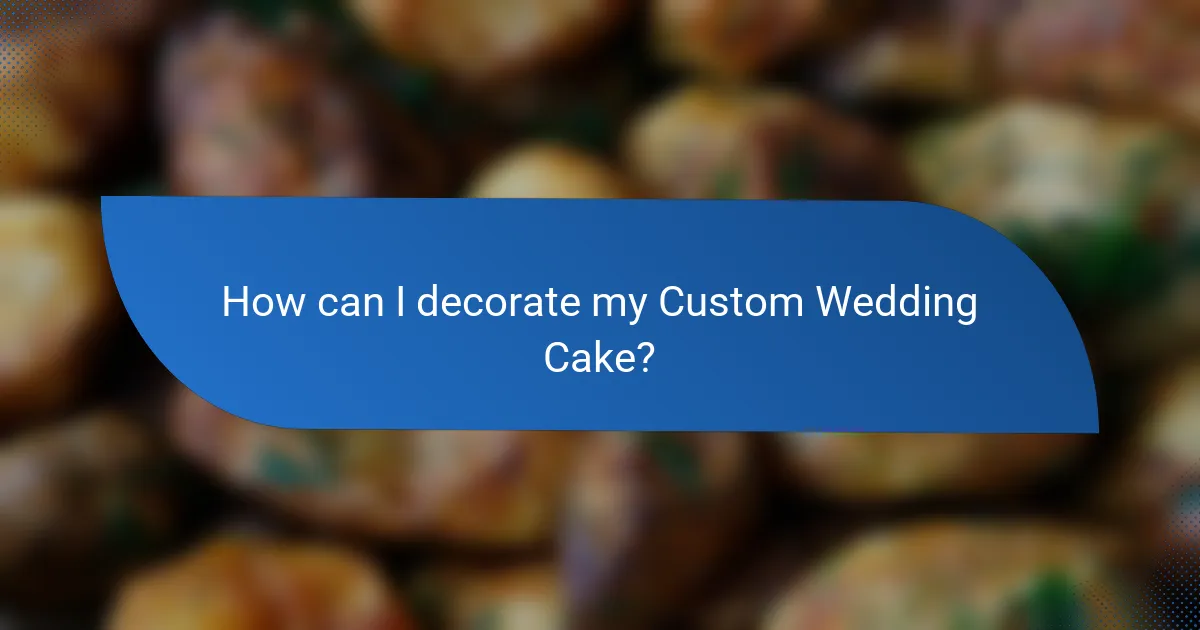
How can I decorate my Custom Wedding Cake?
To decorate your custom wedding cake, use fondant, buttercream, or ganache as your base. Fondant provides a smooth finish and can be molded into shapes. Buttercream allows for intricate piping designs and is easy to color. Ganache offers a glossy finish and can be poured over the cake.
Incorporate fresh flowers or edible decorations for a natural look. Use cake toppers that reflect the couple’s personality or theme. Consider adding edible glitter or metallic accents for a touch of elegance.
Ensure that all decorations are food-safe and suitable for consumption. Properly secure any toppers or heavy decorations to prevent them from sliding off. These techniques enhance the visual appeal and contribute to the overall theme of the wedding.
What are the best decoration techniques for Custom Wedding Cakes?
The best decoration techniques for custom wedding cakes include fondant covering, buttercream piping, and edible flowers. Fondant creates a smooth, polished finish and allows for intricate designs. It can be rolled out and draped over the cake for a seamless look. Buttercream is versatile and can be used for various textures and patterns. Techniques like rosettes and ruffles enhance visual appeal. Edible flowers add a natural touch and vibrant colors. These techniques are widely used by professional bakers for their aesthetic and customizable qualities.
How can I incorporate personal touches into the cake design?
Incorporating personal touches into cake design can enhance its uniqueness. Start by integrating favorite colors of the couple into the cake’s color palette. Use specific flowers that hold sentimental value for decoration. Incorporate meaningful symbols or motifs that represent shared interests or experiences. Personalize the cake topper with the couple’s names or initials. Include flavors that are significant to the couple, such as their favorite dessert. Add edible images that reflect personal memories or milestones. These elements create a cake that tells a story and resonates with the couple’s journey.
What are some popular decoration trends for weddings?
Popular decoration trends for weddings include floral installations, greenery accents, and personalized decor. Floral installations often serve as stunning backdrops or centerpieces. Greenery accents add a natural touch and can be incorporated in table settings or arches. Personalized decor, such as custom signage and monogrammed items, enhances the couple’s unique style. Other trends include using bold colors, vintage elements, and sustainable materials. According to a 2022 survey by The Knot, 70% of couples incorporated greenery into their decor, highlighting its popularity.
What materials are commonly used for cake decoration?
Common materials used for cake decoration include fondant, buttercream, royal icing, and edible decorations. Fondant provides a smooth finish and can be molded into shapes. Buttercream is versatile and can be piped into various designs. Royal icing dries hard and is ideal for intricate details. Edible decorations like sprinkles, chocolate shavings, and fruit add color and texture. These materials are widely used in cake decorating due to their availability and ease of use.
How do different materials affect the overall look of the cake?
Different materials significantly influence the overall look of a cake. The choice of materials determines texture, color, and design elements. For instance, fondant provides a smooth, polished finish, enhancing visual appeal. Buttercream, while softer, allows for more intricate designs but can appear less formal. Edible flowers add natural beauty and color variations. Chocolate decorations can create a rich, elegant look. Each material contributes unique attributes that affect the cake’s aesthetic. The combination of these materials can create a cohesive or contrasting appearance, aligning with the wedding theme.
What are the pros and cons of using fondant versus buttercream?
Fondant provides a smooth finish for cakes, making it ideal for intricate designs. It can be molded easily into shapes and figures. However, fondant can be less flavorful and has a chewy texture that some find unappealing.
Buttercream, on the other hand, offers a rich and creamy taste. It is easy to spread and pipe, making it versatile for decoration. Yet, buttercream can melt in warm conditions and may not hold up as well for elaborate designs.
In summary, fondant excels in aesthetics while buttercream is favored for taste.
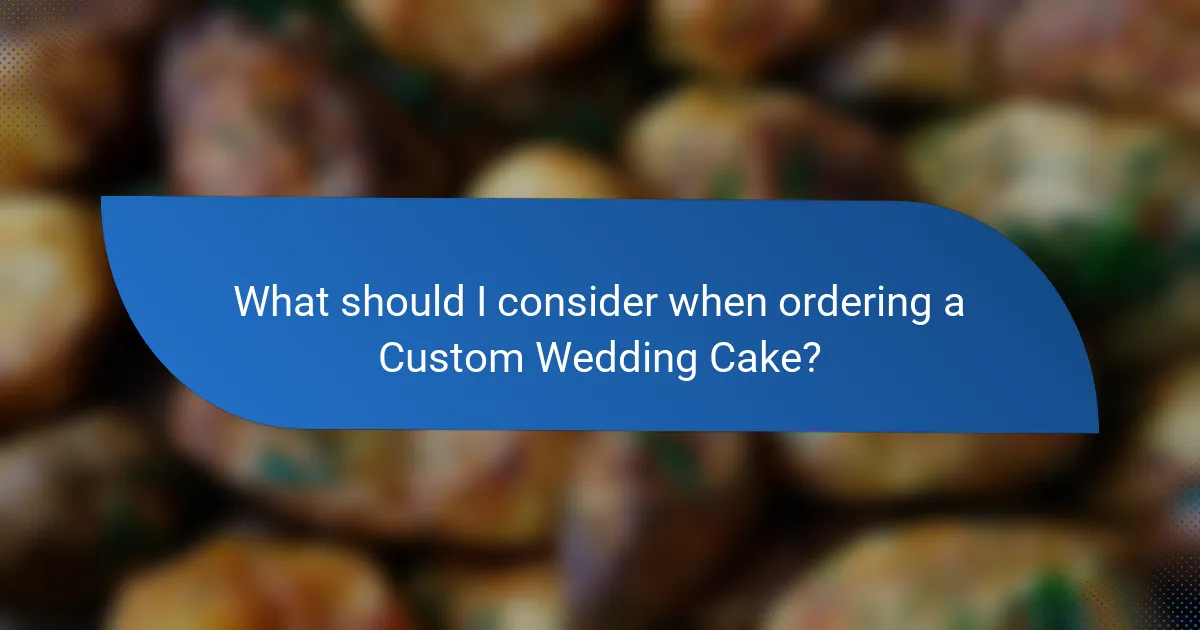
What should I consider when ordering a Custom Wedding Cake?
When ordering a custom wedding cake, consider the couple’s preferences for flavor and design. Flavors can range from classic vanilla to unique options like red velvet or lemon. Design should reflect the wedding theme and personal style. Discuss size requirements based on guest count. Budget is crucial; custom cakes can vary widely in price. Timeline for ordering is important; typically, cakes should be ordered a few months in advance. Dietary restrictions, such as gluten-free or vegan options, must also be addressed. Lastly, research potential bakers and review their portfolios to ensure quality and style match expectations.
How far in advance should I order my Custom Wedding Cake?
Order your custom wedding cake at least 3 to 6 months in advance. This timeframe allows bakers to accommodate your design and flavor preferences. Many popular bakers book up quickly, especially during peak wedding seasons. Additionally, ordering early gives you time for tastings and adjustments. It ensures that you secure your desired date without last-minute stress. Most wedding planners recommend this lead time for optimal results.
What information should I provide to my baker when placing an order?
When placing an order with your baker, provide specific details about your cake. Include the cake size needed for your guest count. Specify the flavor or flavors you desire, such as vanilla, chocolate, or red velvet. Mention any dietary restrictions, like gluten-free or nut allergies. Describe the design and style you envision, including colors and themes. Indicate any specific decorations, such as flowers or figurines. Provide the date and time for the event to ensure availability. Lastly, share your budget to help the baker accommodate your needs.
What are some tips for ensuring my Custom Wedding Cake is a success?
To ensure your custom wedding cake is a success, start by selecting a reputable baker. Research local bakers and read reviews to find one with a strong portfolio. Schedule a tasting session to sample flavors and discuss design ideas. Communicate your vision clearly, including themes and colors. Provide the baker with a timeline for delivery and set up. Confirm details like size and servings to accommodate all guests. Consider the cake’s transportation needs to prevent damage. Finally, plan for proper storage before the event to maintain freshness. Following these steps will help create a memorable and delicious centerpiece for your celebration.
How can I ensure the cake stays fresh for the wedding day?
To ensure the cake stays fresh for the wedding day, store it in a cool, dry place. Avoid direct sunlight or heat, as this can cause melting or spoilage. Use an airtight container to protect the cake from air exposure. If the cake is frosted, refrigerate it to maintain moisture and prevent bacterial growth. Cover the cake with plastic wrap or foil before placing it in the refrigerator. For multi-tier cakes, consider assembling them closer to the event to keep layers fresh. Cakes can remain fresh for several days when properly stored. According to the American Institute of Baking, cakes stored in optimal conditions can last up to a week without losing quality.
What are common mistakes to avoid when ordering a Custom Wedding Cake?
Common mistakes to avoid when ordering a custom wedding cake include not setting a budget, which can lead to overspending. Failing to communicate dietary restrictions can cause issues for guests. Not considering the wedding theme may result in a cake that clashes with the overall decor. Underestimating the number of servings needed can leave guests without cake. Waiting too long to place an order can result in limited options or availability. Lastly, not scheduling a tasting session may lead to disappointment in flavor. Each of these mistakes can affect the overall experience and satisfaction with the wedding cake.
Custom wedding cakes are uniquely designed cakes tailored to the couple’s preferences in style, flavor, and decoration, often reflecting their personalities and wedding themes. The article explores how custom cakes differ from traditional cakes, highlighting their personalized elements and intricate designs. Key characteristics, popular styles, flavor options, and decoration techniques are discussed, along with tips for ensuring a successful cake order. Additionally, the article addresses common mistakes to avoid and provides insights on how to keep the cake fresh for the wedding day.
